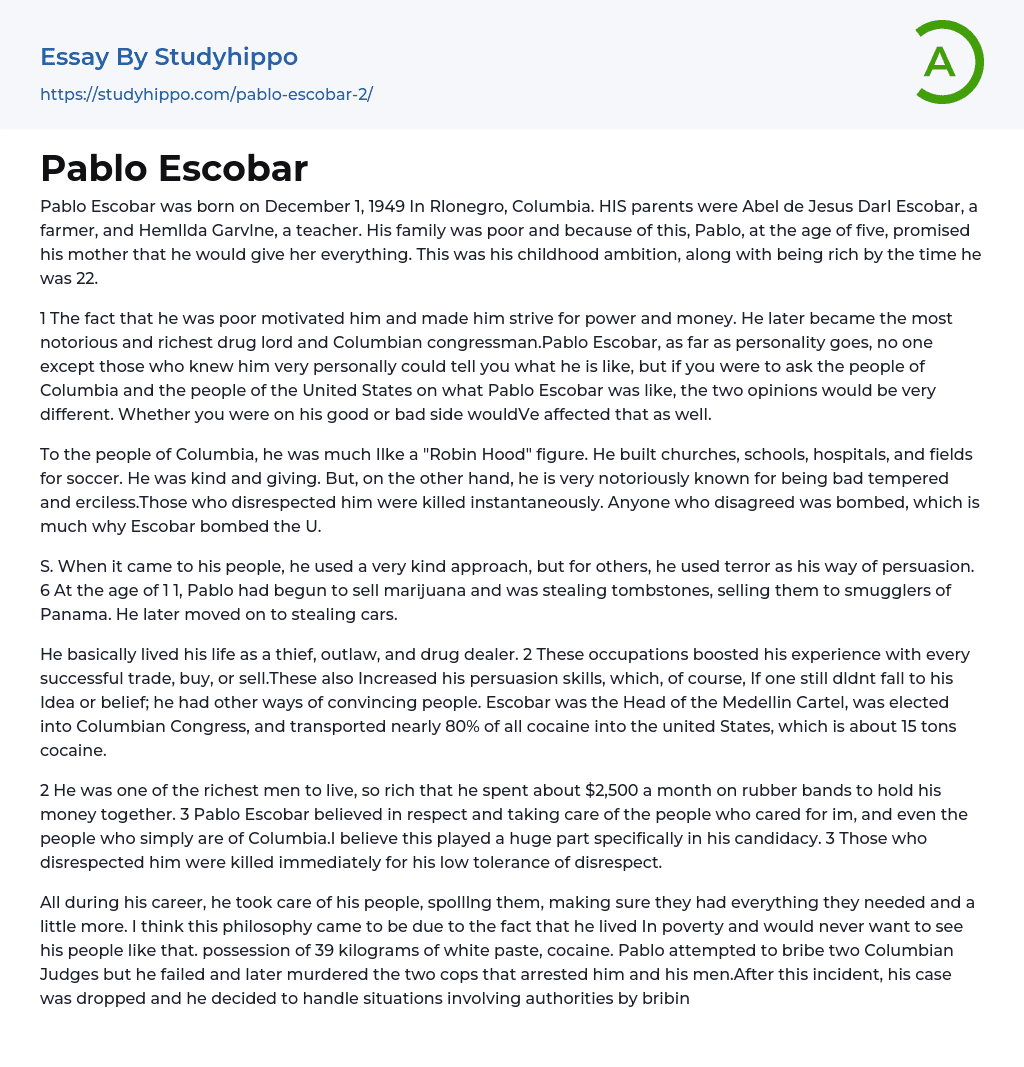Born on December 1, 1949 in Rlonegro, Columbia, Pablo Escobar's parents were Abel de Jesus Darl Escobar and Hemllda Garvlne. His father was a farmer while his mother worked as a teacher. Despite their financial struggles, at the young age of five, Pablo promised to provide for his mother in every way he could. As a result, becoming successful by the age of 22 became one of his main aspirations during his youth.
1 The driving force behind his pursuit of power and wealth was his impoverished background. This ultimately led to his ascent as the wealthiest and most infamous drug lord in Columbian history, as well as a congressman. Despite his notoriety, only those who knew him intimately could attest to his true personality. The opinions of the people of Columbia and the United States regarding Pablo Escobar are varied, depe
...nding on whether one was on his good or bad side.
Despite being described as a generous figure who resembled "Robin Hood" to the people of Columbia due to his contributions to building churches, schools, hospitals, and soccer fields, he was also known for his infamous bad temper and merciless behavior. Disrespect towards him resulted in immediate execution while those who disagreed were met with bombing, such as the bombing of the U by Escobar.
Despite using terror to persuade those outside of his community, Pablo employed a gentle approach with his own people. At the young age of 11, he started selling cannabis and stealing tombstones to sell to Panama smugglers. Eventually, he progressed to car theft.
The core of his existence involved engaging in thievery, disregard for the law, and selling illegal drugs. 2
This line of work honed his skills in making lucrative transactions while also strengthening his abilities to convince others. In cases where someone was not receptive to his requests, he possessed alternative strategies to persuade them. Escobar oversaw the Medellin Cartel, held a position in the Columbian Congress, and oversaw the conveyance of approximately 15 tons of cocaine that composed nearly 80% of its dissemination within the United States.
Pablo Escobar was an extremely rich man, spending $2,500 monthly on rubber bands to secure his money. He believed in looking after those who looked after him and Columbia as a whole, which may have helped his chances of success. However, he had no patience for disrespect and would promptly order the execution of anyone displaying it.
Throughout his professional life, he demonstrated a devotion to his subordinates, attending to their every need and providing them with luxuries. This principle was likely influenced by his experiences growing up in poverty, as he never wished to see his employees suffer similar hardships.
However, Pablo was caught with 39 kilograms of cocaine paste and tried to bribe Colombian judges. When unsuccessful, he proceeded to kill the two police officers who had detained him and his associates. Following this event, authorities dropped the charges against him, and he resolved to manage potential issues regarding law enforcement through either bribery or homicide.
In a situation like this, I would probably have attempted to bribe the authorities as the government in Columbia is known for being corrupt. If persuasion did not work, I would not have resorted to killing the arresting officers as they were just doing their job, and it was Escobar's
fault for getting caught. Despite his negative image in the United States, Pablo had a positive impact on Columbian society as he donated money for constructions of useful facilities such as schools and hospitals, making him a saint-like figure in Colombia's eyes.
Pablo was a supplier to the U.S, shipping a substantial amount of cocaine weighing 15 tons. He had a notorious criminal record and was known for his unwelcome reputation for bombings, threats, and being a serious threat. Consequently, he was regarded as an enemy by the U.S and considered to be a formidable adversary.
- Baptism essays
- Holy Spirit essays
- Jesus Christ essays
- Adam And Eve essays
- Crucifixion Of Jesus essays
- Crusades essays
- Eucharist essays
- God The Father essays
- Pope essays
- Protestantism essays
- Christian essays
- Church essays
- Elizabeth essays
- Sacrament essays
- Catholic Church essays
- Lord essays
- Priest essays
- Protestant Reformation essays
- Culture essays
- Social Control essays
- Citizenship essays
- Social Justice essays
- Caste System essays
- Social Responsibility essays
- Socialization essays
- Deviance essays
- Modern Society essays
- Popularity essays
- Civil Society essays
- Community essays
- Female essays
- Filipino People essays
- Igbo People essays
- Indigenous Australians essays
- Indigenous Peoples essays
- Minority Group essays
- Social Institution essays
- Men essays
- The nation essays
- Middle Class essays
- Social Norms essays
- Discourse Community essays
- Popular Culture essays
- Car Culture essays
- American Culture essays
- Mormon essays
- Indian Culture essays
- Mexican Culture essays
- Pop Culture essays
- Cultural Differences essays




